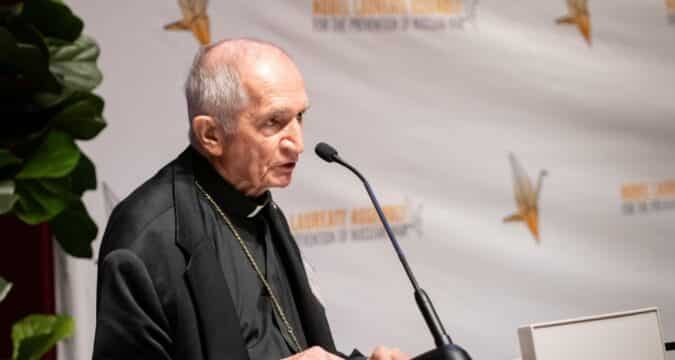
(OSV News): Religious communities can significantly contribute to the global architecture of disarmament and restraint in several specific ways that promote dialogue, prevention, and accountability, according to Silvano Cardinal Maria Tomasi, a longtime Vatican diplomat and advocate for disarmament on July 16.
He was speaking during the Nobel Laureate Assembly for the Prevention of Nuclear War, which took place at the University of Chicago from July 14-16. The event brought together approximately 20 Nobel laureates and 60 nuclear experts to discuss policy recommendations aimed at mitigating the threat of nuclear war.
A key outcome of the gathering was the release of a declaration outlining “pragmatic actions” toward long-term disarmament. The declaration urged Russia, the US and China to recommit to ending nuclear testing, reduce their arsenals, and halt stockpile expansion.
Astrophysicist Brian P. Schmidt, of the Australian National University, co-winner of the 2011 Nobel Prize in Physics; and fellow assembly organizer Daniel Holz, professor of physics, astronomy and astrophysics at the University of Chicago and chairperson of the science and security board of the Bulletin of the Atomic Scientists, introduced Cardinal Tomasi and other speakers at the July 16 public announcement of the assembly’s recommendations.
The bulletin sets the Doomsday Clock, created in 1947 to warn the world how close humanity is to self-destruction through various technologies, is currently at 89 seconds to midnight.
The risk of using nuclear weapons has never been higher than it is now
Masako Wado
Masako Wado, assistant secretary general of Nihon Hidankyo, the Japanese nuclear attack survivor group that received the 2024 Nobel Peace Prize, delivered a video message warning, “The risk of using nuclear weapons has never been higher than it is now.”
She added that “nuclear deterrence, which intimidates other countries by possessing nuclear weapons, cannot save humanity.”
The final day of the assembly marked the 80th anniversary of the Trinity Test, which took place in 1945 at the Alamogordo Bombing Range approximately 338 kilometres south of Los Alamos, New Mexico.
The Trinity Test detonated a plutonium implosion device named “Gadget,” with shockwaves from the blast generating pressure at the bomb’s centre that was 500,000 times greater than the earth’s surface air pressure. Days after the test, the US dropped two nuclear bombs on the Japanese cities of Hiroshima and Nagasaki, killing a combined total of at least 210,000 people.
The test led to radiation contamination of soil, livestock and water, as well as an array of cancers and health issues, among area residents.
Cardinal Tomasi—whose remarks were prefaced by a moment of silence, led by Schmidt, for the victims of nuclear testing and attacks— said that the “religious aspect” of nuclear risk “may offer some ideas of the complexity of the problems and the difficulty in communicating to everybody the disastrous consequences that the eventual use of even one atomic bomb can create.”
The Trinity explosion taught us what we are capable of destroying. The task before us now is to rediscover what we are capable of preserving and building
Cardinal Tomasi
He offered three concrete examples of how religious communities could assist in nuclear deterrence.
“Interfaith verification” programmes would “establish a coalition of religious organizations trained to serve as civil society witnesses within arms control verification regimes,” he said.
“While not inspectors in the technical sense, these religious witnesses would accompany UN teams, offering moral oversight, promoting transparency and increasing public trust in the disarmament process, especially in difficult regions where states distrust each other but still respect faith leaders in some way,” Cardinal Tomasi said.
Secondly, “faith-based early warning dialogue platforms” would “create regional interreligious confidence building mechanisms where faith leaders regularly meet with policymakers, scientists, and civil society actors to identify early signs of arms racing, destabilising doctrines or doctrinal shifts that can cause negative repercussions,” he said.
A “global interfaith council,” comprised of “representatives from major world religions, ethicists, scientists and disarmament experts,” could “assess and publish annual reports on the ethical implications of emerging technologies in relation to nuclear stability,” the cardinal said.
He urged those present to not only mark the Trinity Test anniversary as a “solemn remembrance,” but to regard the occasion as “an act of renewal.”
“The Trinity explosion taught us what we are capable of destroying. The task before us now is to rediscover what we are capable of preserving and building,” said Cardinal Tomasi.
“May this gathering be a milestone not in the remembrance of destruction, but in the awakening of conscience and commitment for peace and for solidarity with the entire human family,” he said.








